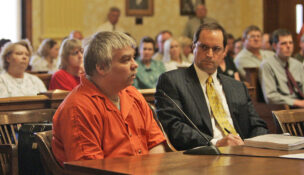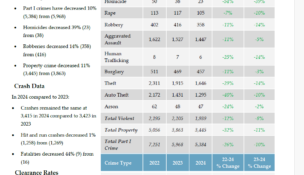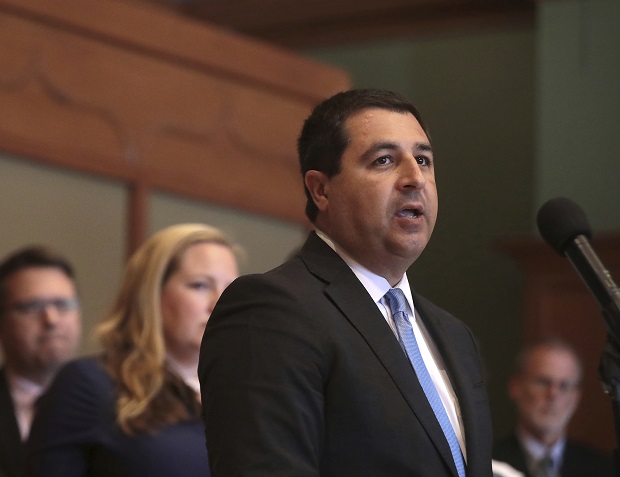Wisconsin Counties Association shows interest in Fannie, Freddie lawsuit (UPDATE)
By: Beth Kevit, [email protected]//July 24, 2012//
Wisconsin Counties Association shows interest in Fannie, Freddie lawsuit (UPDATE)
By: Beth Kevit, [email protected]//July 24, 2012//
A Wisconsin Counties Association committee Tuesday offered initial support for Milwaukee County’s class-action lawsuit against Fannie Mae and Freddie Mac over unpaid taxes.
The association’s board of directors, if it decides in August to approve the committee’s recommendation, must decide what role the WCA will play in the lawsuit.
Andy Phillips, general counsel for WCA, said it could serve as a liaison between counties and the attorneys working on the case. WCA could be instrumental in disseminating information from the attorneys to the counties or in collecting information the attorneys would need to proceed with the case, he said.
Phillips said the lawsuit appeared to be straightforward.
“We simply have to show that those entities weren’t exempt from transfer tax,” Phillips said. “I saw this as a really good opportunity for all the counties in the state.”
The lawsuit’s attorneys, Erin Dickinson and Chuck Crueger, both of Milwaukee-based law firm Hansen Riederer Dickinson Crueger and Reynolds LLC, on Tuesday described the lawsuit to WCA’s County Organization and Personnel Steering Committee. The committee supported contacting each county to recommend they not join an alternate class-action lawsuit, although Dickinson said she had not heard of any such lawsuits.
The lawsuit is based on an ongoing one in Michigan in which a federal judge found in favor of the counties bringing the suit, although the ruling was appealed. At issue is whether the Federal National Mortgage Association, commonly known as Fannie Mae, and the Federal Home Loan Mortgage Corp., commonly known as Freddie Mac, wrongfully claimed exemption from paying real estate transfer taxes, which are paid when property changes hands.
Lawsuits are pending in a number of other states, including Florida and Illinois.
“There has been a flurry of activity,” Dickinson said.
In Wisconsin, transfer taxes are calculated at a rate of 30 cents per $100 of a property’s value. Dickinson and Crueger said it was too soon to estimate how much the counties could stand to gain but did say the statute of limitations on collecting the taxes would let the counties to go back six years.
According to Wisconsin law, the counties keep 20 percent of the transfer taxes they collect and remit the rest to the state Department of Revenue.
If Fannie Mae and Freddie Mac are found not exempt from paying the taxes, the amount of taxes they could owe would need to be calculated. Dickinson said a meeting had been scheduled between the attorneys and main vendors of electronic recordkeeping software to determine how difficult it would be to isolate the deeds related to unpaid taxes.
“Ultimately, we’re going to need data on what transfer fees weren’t paid,” Dickinson said. “The lawyers intend to do most of the work in looking through that data.”
The lawsuit has been filed in federal court on behalf of Milwaukee County and names the other 71 counties in Wisconsin as members of the class. Dickinson said her firm was waiting to hear whether the court approved the counties as a class and to hear Fannie Mae and Freddie Mac’s response to the complaint.
Attempts to reach representatives from the Federal Housing Finance Agency, which oversees Fannie Mae and Freddie Mac, were unsuccessful.
John La Fave, register of deeds for Milwaukee County, estimated his county had missed out on about $1 million in unpaid transfer taxes from Fannie Mae and Freddie Mac during the past six years. La Fave said that meant Milwaukee County, the largest in the state, could recoup about $200,000, as well as future transfer tax revenue, if the lawsuit is successful.
Dickinson said the attorneys would contact the DOR despite its current opinion that Fannie Mae and Freddie Mac were exempt from paying the taxes. She said it was possible the DOR could change its opinion.
Regardless of the state’s opinion, Crueger said, the DOR still would receive its portion of any taxes recovered through the lawsuit.
“If the court says they are not exempt,” he said, “they are not exempt.”
Legal News
- Steven Avery prosecutor Ken Kratz admits ‘mistakes were made’
- Colombian national extradited to Milwaukee faces International narcotics-trafficking conspiracy charge
- MPD: Milwaukee homicides down nearly 40 percent compared to last year
- EVERS: Republican lawmakers No-Show at special meeting to release statewide PFAS funding, stabilize healthcare access
- Wisconsin ICAC Task Force conference on Missing and Exploited Children highlights increase in sextortion cases
- More than 300 Wisconsin officers back in law enforcement after being fired or forced out
- Former Trump staffer who said to ‘fan the flame’ after 2020 loss hired to lead Wisconsin GOP
- Gov. Evers appoints David Casey to Serve as DOR Secretary
- Former Marine sentenced for Molotov Cocktail attack against Planned Parenthood Clinic
- ABA names 34th Annual Margaret Brent Women Lawyers of Achievement Awards honorees
- FBI launches criminal investigation into Key Bridge collapse
- Man charged in slaying after woman’s leg found at Milwaukee-area park
WLJ People
- Power 30 Personal Injury Attorneys – Russell Nicolet
- Power 30 Personal Injury Attorneys – Benjamin Nicolet
- Power 30 Personal Injury Attorneys – Dustin T. Woehl
- Power 30 Personal Injury Attorneys – Katherine Metzger
- Power 30 Personal Injury Attorneys – Joseph Ryan
- Power 30 Personal Injury Attorneys – James M. Ryan
- Power 30 Personal Injury Attorneys – Dana Wachs
- Power 30 Personal Injury Attorneys – Mark L. Thomsen
- Power 30 Personal Injury Attorneys – Matthew Lein
- Power 30 Personal Injury Attorneys – Jeffrey A. Pitman
- Power 30 Personal Injury Attorneys – William Pemberton
- Power 30 Personal Injury Attorneys – Howard S. Sicula











